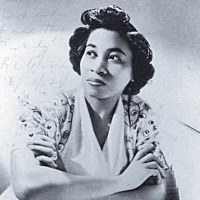1898 - 1971
By: Teri Graham | Date Added:

Lil Hardin was a jazz pianist, the first major female jazz instrumentalist, who played with the King Oliver Creole Jazz Band and Louis Armstrong's Hot Five and Hot Seven bands. She also wrote or co-wrote many jazz songs and fronted several of her own bands in the 1920s and 1930s. Lillian Beatrice Hardin was born in Memphis, Tennessee, on February 3, 1898, to Dempsey Martin Hardin and William Hardin. Dempsey was one of 13 children of a woman who was enslaved from birth; but she only had two children, one who died at birth, and Lillian. Her parents separated when Hardin was quite young and she lived in a boarding house with her mother, who cooked for a White family. She studied piano and organ and played in church from a young age. Growing up, she lived near Beale Street and was attracted to the blues early, but her mother opposed such music. Her mother used her savings to send her daughter to Nashville to study at the preparatory school at Fisk University for a year (1915–1916) for classical music training and a "good" environment. To keep her from the local music scene when she returned in 1917, her mother moved to Chicago and took Lil with her. In Chicago, Lil Hardin took a job on South State Street demonstrating music at Jones' Music Store. There, she met and learned from Jelly Roll Morton, who played ragtime music on the piano. Hardin began finding jobs playing with bands while continuing to work in the store, which afforded her the luxury of access to sheet music. She became known as "Hot Miss Lil." Her mother decided to accept her new career, though she reportedly picked up her daughter promptly after performances to protect her from the "evils" of the music world. In 1918, she achieved some recognition as a house pianist working with Lawrence Duhé and the New Orleans Creole Jazz Band, and in 1920, when King Oliver took it over and renamed it the King Oliver Creole Jazz Band, Lil Hardin stayed around as it gained popularity. Sometime between 1918 and 1920, she married singer Jimmy Johnson. Traveling with King Oliver's band strained the marriage, and so she left the band to return to Chicago and the marriage. When the King Oliver Creole Jazz Band also returned to its Chicago base, Lil Hardin was invited to rejoin the band. Also invited to join the band, in 1922: a young cornet player named Louis Armstrong. They became friends, and after two years, they married in 1924. She helped him learn to dress more appropriately for big-city audiences. She persuaded him to move to New York and join Fletcher Henderson. Lil Hardin Armstrong didn't find work herself in New York, and so she returned to Chicago, where she put together a band at Dreamland to feature Louis' playing. In 1925, Louis Armstrong recorded with the Hot Fives orchestra. Lil Hardin Armstrong played piano for all the Hot Fives and Hot Sevens recordings. She served as his manager as he continued to become more famous. Lil Hardin Armstrong returned to her study of music, obtaining a teaching diploma from the Chicago College of Music in 1928, bought a large home in Chicago and a lakeside cottage retreat. Lil formed several bands, some all-female, some all-male, in Chicago and in Buffalo. She went back to school and earned a post-graduate degree at the New York College of Music, and then returned once more to Chicago and tried her luck as a singer and songwriter. In 1938 she divorced Louis Armstrong, winning a financial settlement and keeping her properties, as well as gaining rights to the songs that they had co-composed. Lil turned away from music and began working as a clothing designer (Louis was a customer), a restaurant owner, and then music and French teacher. In the 1950s and 1960s, she occasionally performed and recorded. On July 6, 1971, Louis Armstrong died. Seven weeks later on August 27, Lil Hardin Armstrong was playing at a memorial concert for her ex-husband when she suffered a massive coronary and died. While Lil Hardin Armstrong's career wasn't as successful, she was the first major woman jazz instrumentalist whose career had any significant duration.
click hereShare your thoughts on this story with us. Your comments will not be made public.
Email
Copyright ©2016 - Design By Bureau Blank